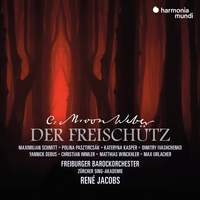Recording of the Week,
Weber's Der Freischütz from René Jacobs
I’ve always had a soft spot for Der Freischütz, but until this terrific new recording hit my desk a couple of days ago I’ve never been able to shake the feeling that it’s one of those pieces where the whole somehow amounts to less than the sum of its parts. With its rather clunky denouement, the standard version of Weber’s Gothic Singspiel about a young marksman who’s lured into dabbling in the dark arts can feel curiously broken-backed - especially on disc, where the lengthy dialogues and supernatural elements often register less vividly than they would in the theatre. René Jacobs, though, hits the target spectacularly, thanks to several magic bullets of his own…
 Perhaps the most striking feature of this version is the Belgian conductor’s ingenious solution to that awkward ending, which is set in motion right after the Overture and involves the reinstatement of material from the original version of Johann Friedrich Kind’s libretto. By the time Der Freischütz made it to the stage, the role of the Hermit who pleads clemency for the erring hero after his unorthodox tactics are revealed is reduced to a single, out-of-the-blue appearance in the final scene, but it wasn’t always thus: as Jacob recounts in his fascinating booklet-essay, Weber’s theatrically-savvy wife persuaded him not to set an early exchange between the Hermit and the heroine Agathe in favour of literally starting the show with a bang.
Perhaps the most striking feature of this version is the Belgian conductor’s ingenious solution to that awkward ending, which is set in motion right after the Overture and involves the reinstatement of material from the original version of Johann Friedrich Kind’s libretto. By the time Der Freischütz made it to the stage, the role of the Hermit who pleads clemency for the erring hero after his unorthodox tactics are revealed is reduced to a single, out-of-the-blue appearance in the final scene, but it wasn’t always thus: as Jacob recounts in his fascinating booklet-essay, Weber’s theatrically-savvy wife persuaded him not to set an early exchange between the Hermit and the heroine Agathe in favour of literally starting the show with a bang.
The librettist came to regret the decision bitterly, and Jacobs puts things to rights by crafting a new prologue which combines dialogue, melodrama and music recycled from the Hermit’s later appearance into a satisfying scene which not only makes the ending feel more organic but also lends a welcome symmetry to the piece as a whole and underlines the Christian element which is largely sidelined in the standard version (Jacobs points out that Weber inscribed the autograph manuscript with the words ‘Soli Deo Gloria’). Christian Immler does ample justice to his beefed-up role, bringing a Sarastro-like authority to his opening prayer and establishing a tender relationship with Polina Pasztircsák’s vulnerable Agathe.
 The forces of darkness, too, are far more present than usual. The demon Samiel, whose voice is normally heard just twice, is a near-constant presence throughout here, dripping poison into Max’s ear and breaking the fourth wall to disconcert the audience as well as conspiring with his mortal henchman Kaspar; his additional dialogue was largely improvised by the German actor Max Urlacher (who has an absolute ball with the role), though a chilling monologue before the climactic context was drawn from August Apel’s earlier, tragic version of the story. Agathe’s father Kuno also gets more to do, with Jacobs setting his tale about an ill-fated poacher to music from Schubert’s supernatural Singspiel Des Teufels Lustschloss.
The forces of darkness, too, are far more present than usual. The demon Samiel, whose voice is normally heard just twice, is a near-constant presence throughout here, dripping poison into Max’s ear and breaking the fourth wall to disconcert the audience as well as conspiring with his mortal henchman Kaspar; his additional dialogue was largely improvised by the German actor Max Urlacher (who has an absolute ball with the role), though a chilling monologue before the climactic context was drawn from August Apel’s earlier, tragic version of the story. Agathe’s father Kuno also gets more to do, with Jacobs setting his tale about an ill-fated poacher to music from Schubert’s supernatural Singspiel Des Teufels Lustschloss.
Jacobs’s use of period instruments provides further revelations, with rasping natural horns, fife-like flutes and judiciously wonky string-intonation all adding to the rough-and-ready rustic atmosphere. Laurence Equilbey’s recent highlights-only recording aside, Freischütz has tended to get the full-fat treatment on disc, with conductors generally treating it as a precursor to Wagner’s similarly spooky Der fliegende Holländer; Jacobs, however, places it firmly in the tradition of Mozart’s Die Zauberflöte, which he recorded so marvellously in 2010. (I recall the Tamino on that set, Daniel Behle, telling me that the project felt more akin to a radio-play than a straightforward studio-recording - and that’s exactly what we get here as well, with birdsong, storms and crackling hellfire aplenty).
Casting, too, is radically different from the norm, and works beautifully: Agathe and Max are typically assigned to seasoned Wagnerians (Marek Janowski’s recent recording boasted Lise Davidsen and Andreas Schager), whereas Jacobs gives us lighter, limber voices in the shape of Maximilian Schmitt and Hungarian soprano Polina Pasztircsák – and even the hefty-voiced Kaspar, Dimitry Ivashchenko, is no slouch when it comes to getting round the devilish coloratura of his vengeance-aria. Special mention for Ukrainian soprano Kateryna Kasper, whose Ännchen is more feisty cougar than perky soubrette: Jacobs explains that he sees her as the older of the two women, contrary to received opinion.
A palpable hit, then, and possibly the year’s most exciting opera recording to date – prepare to have your spine thoroughly chilled!
Maximilian Schmitt (Max), Polina Pasztircsák (Agathe), Kateryna Kasper (Ännchen), Dimitry Ivashchenko (Kaspar), Yannick Debus (Kilian), Matthias Winckhler (Kuno), Christian Immler (Hermit), Max Urlacher (Samiel)
Freiburger Barockorchester, Zürcher Sing-Akademie, René Jacobs
Available Formats: 2 CDs, MP3, FLAC, Hi-Res FLAC



